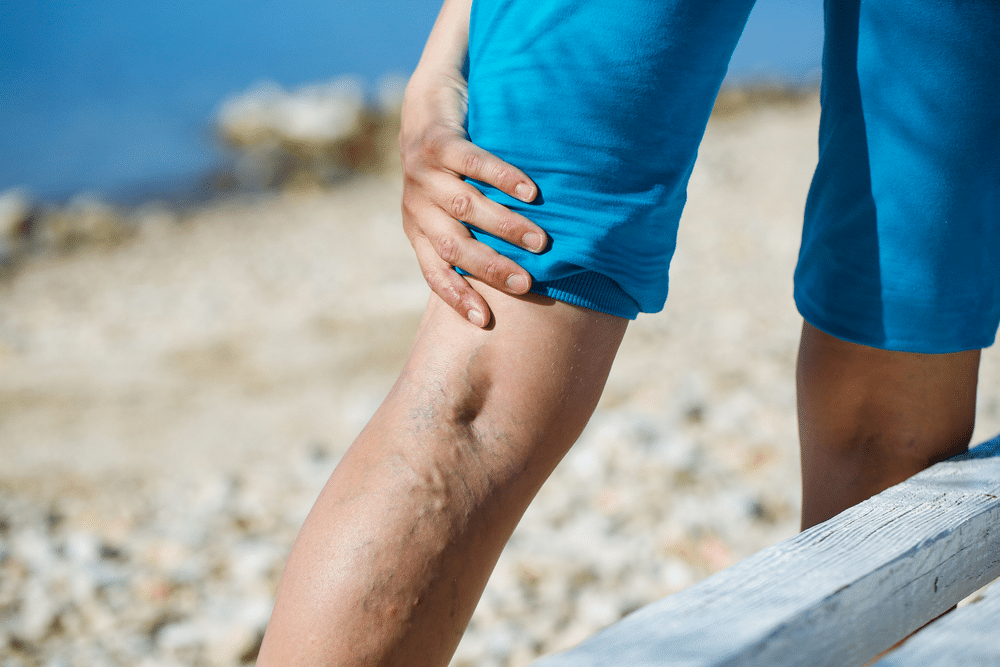Venous disorders can lead to serious complications and should be treated by a professional that specializes in them. That is why it is so important to seek the advice and care of a vein specialist like Dr. Schroeder at the VENUS Vein Clinic in Omaha, NE if you notice signs of a problem. Keep reading to learn more about what to look out for.
8 Signs It May Be Time to See a Vein Specialist
1. You Are Experiencing Pain or Swelling in One Leg and Not the Other
Although you may associate pain and inflammation with muscle or joint injuries, sometimes they are an indication of circulatory or vein issues. When you notice pain, swelling, or fluid retention in one leg and not the other, it could be a sign of inadequate circulation in that leg and should be checked by a vein specialist.
2. There are Noticeable Raised and Discolored Veins Under Your Skin
When veins appear as red, blue, or purple lines on your skin, it can be a sign of trouble. Although many people consider spider or varicose veins to be purely cosmetic, they can cause complications or be a sign of other venous disorders. It is best to have them checked out.
Larger varicose veins, in particular, may lead to discomfort, dryness, or a burning sensation. You will recognize them by their twisted and bulging appearance, almost like a piece of rope or cord under the skin.
3. Your Legs Feel Heavy or Weak at the End of the Day
For most people, standing for an extended period of time should not cause your legs to feel heavy, weak, or tired. If you notice this happening regularly, contact a specialist to determine if there is a blockage or other problem with the veins in your legs.
4. You Experienced Vein Problems in an Earlier Pregnancy
Pregnancy can cause a strain on the circulatory system. Blood pressure increases, which causes extra stress on thin vein walls. In fact, hemorrhoids are a form of varicose vein that commonly occurs in pregnancy due to these factors.
If you have had venous trouble in an earlier pregnancy, talking to someone ahead of time may help you avoid them during your current one. After all, this should be a joyous time in your life: not one filled with concern about or discomfort from venous disorders.
5. You Have Persistent Leg Pain
Persistent pain can be caused by many different factors. You may have arthritis, a muscle strain, or shin splints, for example. However, persistent pain that does not resolve and that does not have an obvious cause could be a sign of trouble with your veins.
6. There Are Dry, Itchy Spots Near Your Feet or Ankles
Any disruption to the circulatory system in your legs can cause dry and itchy skin. This is most common on the ankles or around your feet since blood has to travel the furthest to get to your extremities.
Try using a moisturizing product and avoid soaking your feet in hot water to see if it resolves. If not, contact a specialist to see if it could be a sign of something more serious.
7. You Have a Family History of Venous Disease
There is a strong genetic link in vein disease. If you have a family history of trouble, it can help to be proactive. Talk to a vein specialist to get an accurate assessment of your risks and what lifestyle changes you can make to minimize them.
8. You Have Sores on Your Legs That Will Not Heal
This is commonly associated with diabetes, but sores on your legs that resist healing can also be a sign of compromised circulation. A vein specialist can perform diagnostic tests to determine if a vein is causing the issue.
What Can a Specialist Do?
Vein specialists are trained to recognize symptoms of venous disorders and problems with the circulatory system. Through a comprehensive exam and evaluation, and by utilizing a variety of diagnostic screenings and tests, they can help determine what is causing your symptoms.
Treatment Options
At the VENUS Vein Clinic, we offer several treatments for vein concerns. The most effective treatment will depend on your concerns and condition. For some patients, lifestyle modifications may be recommended. These can involve elevating your legs, increases moderate-intensity exercise, and taking steps to reduce your blood pressure. Compression stockings are often an effective solution for minor discomfort and swelling associated with vein conditions of the legs.
Sclerotherapy is a tried and true treatment that can be safely performed on most people. It helps to treat spider and varicose veins. Radiofrequency ablation delivers heat that causes veins to scar and fade. Venaseal is a special type of ablation that uses a medical-grade adhesive to seal off unhealthy veins.
Our office also offers Varithena treatments. These utilize a specially formulated foam that clogs and seals off damaged veins. Phlebectomy involves removing unhealthy sections of the vein through small incisions. This should only be done by trained vein specialists like Dr. Schroeder.
Take Charge of Your Vein Health
To learn more about signs of vein trouble, contact the VENUS Vein Clinic in Omaha, NE. Dr. Schroeder and her knowledgeable staff can help determine if the symptoms you are experiencing are signs of a vein disorder. Contact us today to schedule a consultation.

